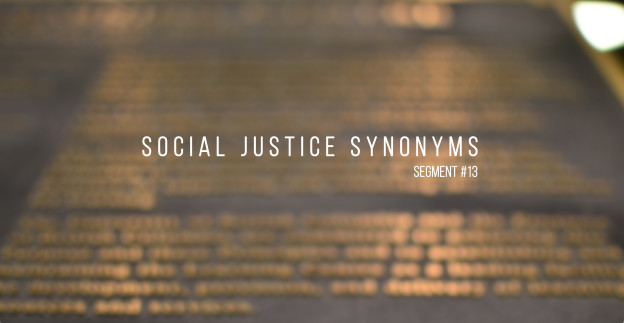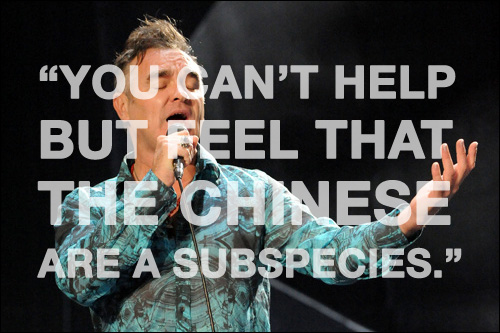This week’s phrase is “pig”.
“Cops are power-hungry pigs”
“Men can really be pigs at times”
“They’re a bunch of capitalist swine”
All are fairly common sentences that emerge even in the most socially and politically aware crowds.
I don’t doubt that there are often very justified reasons for anger against cops, men, or whoever else you may be disgusted at. But unless you sincerely mean that cops, men or the persons you are referring to are smart, brave, and fiercely dedicated, using the term ‘pig’ to insult others would not only be grossly inaccurate of pigs, but also deeply speciesist. In other words, it would reinforce oppressive thought systems that subjugate thinking, feeling beings for arbitrarily being ‘too’ different – just like how subjugating others for being a different sex, race, class or sexual orientation is arbitrary and illogical.
Using the term ‘pig’ as a derogatory label may seem especially tempting, since few of us have actually met pigs in person, and hence the social risk of accidentally offending someone is very low. Ever been called out for using a sexist/racist/ableist or homophobic term? I know I have. There are a lot of problematic currents running through our daily vocabulary, and fortunately more of us are actively trying to push ourselves and our communities to adopt increasingly inclusive language. However, speciesist slurs like ‘pig’, ‘chicken’ and ‘bitch’ almost always escape unchallenged. When they are challenged, arguments against the these slurs focus on how ‘dehumanising’ it is, and consequently how morally repulsive it is to equate a human to a nonhuman. Arguments rarely focus on how inherently speciesist it is for animals, and often operate on the unspoken assumption that nonhuman animals are inferior, and are worthy only for objectification.
Why exactly is using speciesist language harmful anyway? It’s not like pigs will ever accidentally overhear us and feel hurt, right?
This is true – pigs nor any other animal may never be offended at referring to them in such an objectifying light. However, objectifying language hurts the objectified group via multiple pathways. Most will agree that even if I’m out drinking with my straight cis male friends, it still wouldn’t be appropriate for us to make sexist or homophobic remarks, despite there being no women nor queer people present. Why? Two main reasons:
- Our perception of the world is very largely controlled by the language we use to describe it. Consider the very limited ways in which the media portrays Islam, why these limited set of personas proliferate and how this directly forms the Western perception of Muslims. In short, even if animals are not able to suffer directly from oppressive words we use, the words we use to represent animals affects our collective perception of animals. Thus, using words like ‘pig’, ‘chicken’ or ‘bitch’ derogatively only supports the oppressive doxa that pigs, chickens, and bitches are indeed vile and repulsive objects only useful instrumentally.
- Our actions reinforce social norms, and social norms in turn inform our attitudes and actions in a cyclical manner. Essentially, what we deem as appropriate or moral behaviour is picked up by the community we surround ourselves with. By extension, every time we propagate a hurtful behaviour or idea in our community, we are giving social credit to that behaviour or idea, thus encouraging its future survival and giving it potential to be weaponised.
This is one of the same reasons why making sexist remarks even in the absence of women is still not okay. Using a derogatory label for women is a social signal to others that you think women are worth less than men – and this signal indirectly gives social approval to other sexist ideas, behaviours and actions. By the exact same logic, using labels for animals in a speciesist, demeaning way indicates one’s social approval of other speciesist ideas, behaviours and actions.
Speciesism has also been used against folks of colour and Indigenous people. The ‘animalisation’ of racialized people was, and still is, a method to justify discriminatory views and even racial violence. Racism and speciesism are often found coupled and mutually propped on one another.
A well-known phenomenon is the depersonification of Black people by recasting them as non-human animals. One of the starker incidences centered around Sarah (Saartjie) Baartman – a South African Khoi woman who was paraded around Europe to exhibit her ‘strange’, more ‘animal-like’ proportions relative to white women. Her different biological features were sensationalist fuel to prevailing racist stereotypes – that Black people were more animalistic and thus worthy only of the way animals were (and are still) treated. While this example was in the early 19th century, it still has lasting, oppressive effects today. Even US President Obama suffers from having his Blackness equated to non-humanness in a derogatory way.
As well, colonizers use(d) stereotypes of ‘savagery’ and ‘animalistic barbarity’ to dehumanize Indigenous people and justify ongoing colonization of Indigenous lands.
One of the more memorable examples of speciesism and racism combining was ironically propagated by world famous ‘animal advocate’ and vegetarian Morrissey. In response to a case of animal abuse in China, he said: “You can’t help but feel that the Chinese are a subspecies.”
Of course, even disregarding the fact that Western diets actually comprise of far higher amounts of animal products and so are more cruel on a per capita basis – it is strange Morrissey does not see the hypocrisy in fighting for animals by condemning its oppressors as animals. Speciesism and racism is clearly deeply entwined in one another within Morrissey’s mind – and illogically, speciesism is used to justify his pre-existing racist view of Chinese people.
Unfortunately, this sort of thinking isn’t confined to Morrissey or other eccentric individuals. Sadly, even many well-known animal rights organisations like PETA and Sea Shepherd often play on racist undercurrents of Westerners for their gain.
Speciesism used to further poison racism is especially sensitive to me as a person of colour. However this is just one of the many ways speciesism can and is used to justify other oppressive ideologies. Feminist academics and activists like Carol J. Adams have done amazing work in exposing how our inherent speciesist biases are used to further oppress women, and more generally how similarly sexism and speciesism are structured with many examples from mainstream media.
Will fully abstaining from using speciesist terms and insults end the oppression of women, people of colour, and other oppressed groups? Likely not. But, I sincerely believe that disrupting and refusing to accept speciesist vocabulary neutralise one of the most common and potent weapons oppressors use: language. More importantly, it does this without sacrificing or impeding the animal rights movement. It turns out we can (and more effectively, too) resist the oppression of humans without having to throw nonhumans under the bus.
In short, we should strive to disrupt the normalisation of speciesist expressions not just for the obvious value for animals – but also for all other groups who have been oppressed by speciesism.
| Use/Context | Alternatives |
| Cops are power-hungry pigs. | Cops are abusers of power and responsibility. |
| Men can really be pigs at times. | Men can really behave disgustingly at times. |
| They’re a bunch of capitalist swine. | They’re a bunch of capitalists who are only hungry for profit. |
| I’m sorry, I’m sweaty as a pig right now. | I’m sorry, I’m really sweaty right now. (Like dogs, pigs don’t actually have sweat glands and can’t sweat) |
| Last I saw, he was pigging out at the buffet table. | Last I saw, he was busy inhaling food at the buffet table. |
Wilson Wong is a recent UBC Materials Engineering alumni and activist passionate about animal and poverty issues. He is a member of Direct Action Everywhere, a professional dog petter, and probably spends too much time arguing on the internet.
Note 1: A previous version of this post originally included: “Arguments rarely focus on how inherently speciesist it is for animals, and often operate on the unspoken assumption that nonhuman animals are inferior, are dumb, and are worthy only for objectification.” A reader (rightly) notified the me that the use of ‘dumb’ in this context is, and/or appears, ableist. I’ve since revised the post to remove the word. To be clear, I do not believe moral worth is based on intelligence – I was attempting to illustrate that many people use the perceived lack of intelligence of nonhumans as a justification for oppressing them. I intended to illustrate this without also implying my support for this rationale – but clearly this did not work and I had not been clear enough in my writing. I apologise if my writing was upsetting.
Note 2: In my original post, I claimed that pigs, like dogs, did not have sweat glands and do not sweat. As pointed out rightly by a reader – I was wrong for both species. Apparently all mammals have sweat glands – although pigs and dogs sweat negligibly (and so they appear to never sweat). I’ve edited the piece to reflect the facts.





